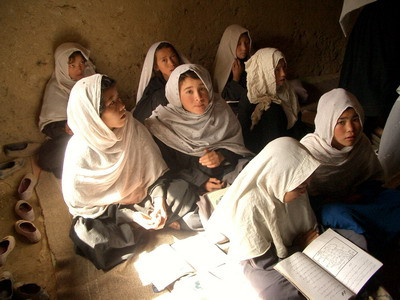By Fran Blandy
DAKAR — Armed conflict is keeping 28 million children around the world out of schools, where they are often targets of sexual abuse and violence, according to a report released Tuesday by UNESCO.

AFP, Mar. 2, 2011: In Afghanistan, at least 613 attacks on schools were recorded in 2009, up from 347 in 2008, while insurgents in northwestern Pakistan have made numerous attacks on girls? schools including one in which 95 girls were injured. (Photo: Madre)
The report titled "The Hidden Crisis: Armed Conflict and Education" said that 42 percent of children not enrolled in schools around the world live in poor countries wracked by conflict.
This often leads to a vicious cycle in which poverty and lack of development are reinforced by a lack of education, and the risk of further conflict is heightened as millions of youths fail to find employment.
"Armed conflict remains a major roadblock to human development in many parts of the world, yet its impact on education is widely neglected," UNESCO Director General Irina Bokova said in a statement released at the report's launch in Dakar.
Thirty-five countries were affected by armed conflict from 1999 to 2008, of which 15 are in sub-Saharan Africa.
"Children and schools are on the front line of these conflicts with classrooms, teachers and pupils seen as legitimate targets," the statement said.
In Afghanistan, at least 613 attacks on schools were recorded in 2009, up from 347 in 2008, while insurgents in northwestern Pakistan have made numerous attacks on girls? schools including one in which 95 girls were injured.
According to the report, insecurity and fear associated with sexual violence keep young girls in particular out of school. Rape and sexual violence have been widely used as a tactic of war in countries such as Chad, the Democratic Republic of Congo, Liberia, Rwanda and Sierra Leone.
Liberia's deputy minister for planning and research in the education ministry, Rex Dahn Kadiker, told how a group of armed men invaded his home village in 1990, forcing two girls to undress and raping them in plain sight.
"There were no teachers around, no students around. It is obvious that where there is civil conflict there is no education," he said at the launch.
Liberia, along with countries such as Burundi, Nigeria and Sierra Leone, has the added risk of an especially young population, with over 60 percent under age 25, a "youth bulge" which could contribute to violent conflict.
UNESCO warned that the system of humanitarian aid is failing children, with aid skewed toward a small group of countries identified as national security priorities, neglecting many of the world's poorest countries.
"Aid for basic education has increased more than fivefold in Afghanistan over the past five years, but it has stagnated or risen more slowly in countries such as Chad and the Central African Republic, and declined in Ivory Coast," reads the report.
Education represents only two percent of humanitarian aid, the report says, estimating that it would take just six days of military spending by aid donors to close the 16 billion US dollar external financing gap in achieving education for all.
Currently, 21 developing countries budget more for military spending than primary education, and pressure has grown on national budgets in the wake of the financial crisis.
The report notes progress in education in some of the world's poorest countries, but with more than 67 million children out of school in 2008, prospects for achieving the goal of universal primary education by 2015, set in Dakar in 2000, are dimming.
In sub-Saharan Africa, 10 million children drop out of primary school every year and about 38 percent of the region's adults (167 million people) still lack basic literacy skills -- most of them women.



